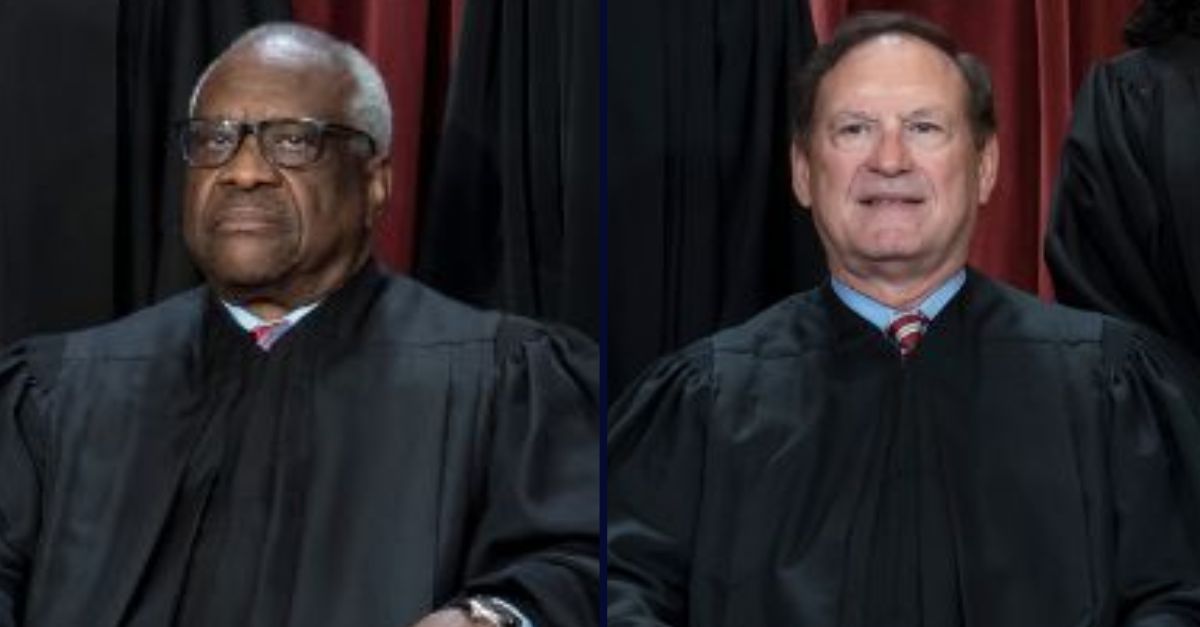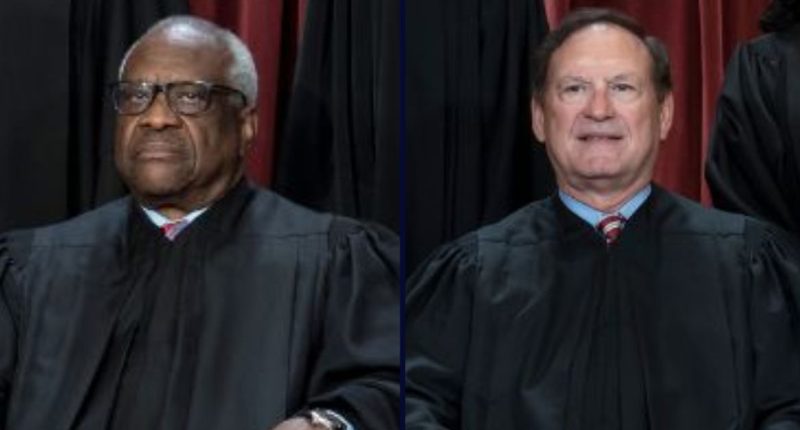
Left: Associate Justice of the Supreme Court Clarence Thomas. Right: Associate Justice of the Supreme Court Samuel Alito. (Alex Wong/Getty Images.)
Two of the Supreme Court’s stalwart conservative justices railed against the Court’s majority for not allowing Alabama and a coalition of Republican-led states to step in and attempt to block dozens of climate-change lawsuits filed by states led by Democrats against energy companies.
California, Connecticut, Minnesota, New Jersey, and Rhode Island have filed over two dozen lawsuits against Exxon Mobil, BP, Chevron and other oil companies seeking to hold them responsible for deceiving customers about the risks posed by fossil fuels. The particularities of the lawsuits vary, as each raises a set of allegations arising under the laws of the relevant state.
In general though, the lawsuits charge that the companies have known for decades that greenhouse gas emissions from use of fossil fuels would contribute to climate change, and that the companies failed to warn consumers and used deceptive marketing practices that maximized profit, tricked consumers, and harmed the environment.
California was the first to file one of these lawsuits in 2023. At the time, Gov. Gavin Newsom, a Democrat, said the energy industry has been lying to citizens for over half a century. Newsom also said oil companies should be held accountable for “wildfires wiping out entire communities, toxic smoke clogging our air, deadly heat waves, record-breaking droughts parching our wells.”
Alabama and 18 other Republican-run states sought to block the climate change lawsuits on the basis that California and the others were unconstitutionally attempting to dictate interstate energy policy beyond their own borders via the use of tort lawsuits. The states argue that this practice infringes on the federal government’s exclusive authority to regulate interstate emissions. The group requested to file a complaint directly with the Supreme Court as a dispute between states themselves, invoking the Court’s rarely-used original jurisdiction.
California and the other defendant states challenged the filing and argues that the arguments Alabama and the others were seeking to raise could be raised by the energy companies in the climate change lawsuits themselves. In its brief, the California group argued that “Alabama’s desire to protect those private defendants from liability is not the kind of sovereign concern that warrants an exercise of this court’s original jurisdiction.”
The Court, without comment from the majority, declined to allow Alabama and the others to file their complaint before the justices Monday.
Justice Clarence Thomas penned a dissenting statement, joined in full by Justice Samuel Alito. in which Thomas chastised the justices for eschewing their responsibility to hear disputes between states. Thomas wrote that “the Court’s assumption that it has ‘discretion to decline review’ in suits between States is ‘suspect’ at best.”
According to Thomas, “This discretionary approach is a modern invention that the Court has never persuasively justified.” He wrote that the Court’s decision to make only “sparing use” of original jurisdiction is “part of a broader policy” that seeks to limit the Court’s caseload relating to disputes between states, which have the potential to become overwhelming in modern society.
Thomas, however, said that despite the rationale, decisions to decline review of disputes between states “are not ours to make,” as it is the Constitution that sets out the bounds of original jurisdiction. Further, he argued, the ruling, “leaves the 19 plaintiff States without any legal means of vindicating their claims against the 5 defendant States.”
A similar outcome occurred in the 2021 case of Texas v. California, in which Texas attempted to challenge a California law that prohibited the state from spending any money on travel to other states that fail to offer adequate protections for LGBTQ individuals. As in the climate change case, Texas alleged constitutional violations and asked the high court to weigh in. The justices declined to allow Texas to proceed with the filing, and Alito issued a scathing dissent — joined by Thomas — in which he said that the “economic warfare” between Texas and California is precisely the kind of case for which the Court has original jurisdiction.
The Court does occasionally exercise original jurisdiction, mostly in cases involving water rights, the dissent noted.
Love true crime? Sign up for our newsletter, The Law&Crime Docket, to get the latest real-life crime stories delivered right to your inbox.
Colin Kalmbacher contributed to this article.





